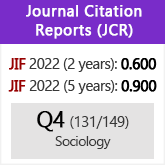Structural, Rational, and Mediatized Vote in the Spanish General Elections from 1996, 2000 and 2004
DOI:
https://doi.org/10.3989/ris.2007.01.01Keywords:
Economic Voting, Electoral Cleavage, Framing War, Media System, Voting ModelsAbstract
The article presents three voting models that attempt to explain what is specific about each of the last three general elections held in Spain. Thus, a structural model is proposed for the 1996 elections, a rational-economic model for the elections in 2000, and a mediatized model to explain the mechanisms that intervened in the 2004 elections. The article then presents a voting model that attempts to integrate the main conclusions drawn from each of the previous models. Special emphasis is placed on the communicational mechanisms of the last elections (2004), underlining the influence of the media in attributing responsibility, the issue according to which voters evaluate public policy. Simultaneously, attention is called to the active role of the audiences in selecting the messages that are coherent with their personal experience and their cultural pattern.
Downloads
References
Caínzos, M. (2001), “La evolución del voto clasista en España, 1986-2000”, Zona Abierta 96/97: 91-172.
Castells, M. (2003), La era de la información. El poder de la identidad, Madrid, Alianza Editorial.
Entman, R. (1993), “Framing: toward clarification of a fractured paradigm”, Journal of Communication, 43: 51-58. doi:10.1111/j.1460-2466.1993.tb01304.x
Entman, R. (2004), Projections of Power. Framing News, Public Opinion, and US Foreign Policy, Chicago, The University of Chicago Press.
Esping-Andersen, G. (1985), Politics against Markets: The Social-Democratic Road to Power, Princeton, Princeton University Press.
Esping-Andersen, G. (1990), The Three Worlds of Welfare Capitalism, Oxford: Polity Press [Los tres mundos del Estado de Bienestar, Valencia, Alfons el Magnánim, 1993].
Fiorina, M. (1981), Restrospective Voting in American National Elections, New Haven: Yale University Press.
Fraile, M. (2005), Cuando la economía entra en las urnas. El voto económico en España (1979-1996), CIS, Monografías 217.
Giner, S. y L. Moreno (1990), “Centro y periferia: la dimensión étnica de la sociedad española”, en Giner: España. Sociedad y política, Madrid, Espasa-Calpe, pp. 169-198.
González, J. J. (1992), Clases sociales: estudio comparativo de España y la Comunidad de Madrid 1991, Madrid, Consejería de Economía de la Comunidad de Madrid.
González, J. J. (1996), “Clases, ciudadanos y clases de ciudadanos. El ciclo electoral del pos-socialismo (1986-1994)”, REIS, 74: 45-76.
González, J. J. (1998), “Política y demoscopia. Los sondeos y las elecciones generales de 1996”, Empiria, 1: 181-199.
González, J. J. (2002), “Las elecciones generales de 2000. Voto ideológico/voto racional”, Revista Internacional de Sociología, 32: 7-33.
González, J. J. (2004), “Voto y control democrático. Las elecciones del 14-M”, CPA Estudios 8, publicación on line del Dpto. de Ciencia Política y de la Administración de la UNED: http://www.uned.es/dcpa/estudios.html.
González, J. J. (2005), “Bases sociales de la política española”, en González y Requena: Tres décadas de cambio social en España, Madrid, Alianza Editorial, pp. 253-276.
Hallin, D. y P. Mancini (2004), Comparing Media Systems. Three Models of Media and Politics, Cambridge, Cambridge University Press.
Iyengar, Sh. (1991), Is Anyone Responsible? How Television Frames Political Issues, Chicago: The University of Chicago Press.
Kinder, D. y Th. Nelson (2005), “Democratic Debate and Real Opinions”, en Callaghan y Schnell: Framing American Politics, University of Pittsburg Press.
Lewis-Beck, M. S. y M. Paldam (2000), “Economic voting: an introduction”, Electoral Studies, 19: 113-121. doi:10.1016/S0261-3794(99)00042-6
Lipset, S. M. et al. (1991), “Are Classes Dying?”, International Sociology, 6: 397-410. doi:10.1177/026858091006004002
Lipset, S. M. et al. (1993), “The Declining Significance of Social Class”, International Sociology, 8: 293-316. doi:10.1177/026858093008003003
Lipset, S. M. y S. Rokkan (1967 [1992]), “Estructuras de division, sistema de partidos y alineamientos electorales”, en Batlle, Albert (ed.), Diez textos básicos de ciencia política, Barcelona, Ariel, pp. 231-273.
Manin, B. (1998), Los principios del gobierno representativo, Madrid: Alianza Editorial.
Maravall, J. M. (2003), El control de los políticos, Madrid: Taurus.
McCombs, M. (2004), Setting the Agenda, Oxford: Polity.
Meyer, Th. (2002), Media Democracy. How the Media Colonize Politics, Oxford: Polity.
Olmeda, J. A. (2005), “Miedo o engaño: el encuadramiento de los atentados terroristas del 11-M en Madrid y la rendición de cuentas electoral”, Real Instituto Elcano, Documento de Trabajo 24/2005.
Przeworsky, A. (1985 [1988]), Capitalismo y socialdemocracia, Madrid: Alianza Universidad.
Przeworsky, A. y J. Sprague (1986), Paper Stones. A History of Electoral Socialism, Chicago: The University of Chicago Press.
Sampedro, V. (2005), 13-M. Multitudes on line, Madrid: Los Libros de la Catarata.
Swanson, D. (1995), “El campo de comunicación política. La democracia centrada en los medios”, en Muñoz Alonso y Rospir (editores), Comunicación Política, Madrid, editorial Universitas, pp 3-24.
Travesedo de Castilla, C. (2005), “Las credibilidades en duelo durante la crisis del 11 al 14-M. La necesidad de desmitificar al grupo Prisa”, Razón y Palabra, 47: http://www.cem.itesm.mx/dacs/publicaciones/logos/anteriores/n47/ctravesedo.html.
Verón, E. (1998), “Interfaces. Sobre la democracia audiovisual evolucionada”, en Ferry et al.: El nuevo espacio público, Barcelona, Gedisa.
Downloads
Published
How to Cite
Issue
Section
License
Copyright (c) 2009 Consejo Superior de Investigaciones Científicas (CSIC)

This work is licensed under a Creative Commons Attribution 4.0 International License.
© CSIC. Manuscripts published in both the printed and online versions of this Journal are the property of Consejo Superior de Investigaciones Científicas, and quoting this source is a requirement for any partial or full reproduction.All contents of this electronic edition, except where otherwise noted, are distributed under a “Creative Commons Attribution 4.0 International” (CC BY 4.0) License. You may read here the basic information and the legal text of the license. The indication of the CC BY 4.0 License must be expressly stated in this way when necessary.
Self-archiving in repositories, personal webpages or similar, of any version other than the published by the Editor, is not allowed.

















